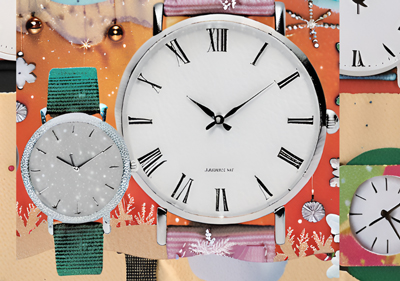Brain Rules - What Makes a Recipient Happy?
What kind of gifts do recipients adore? What seperates them from gifts that they don't. Let's find out.
Most people buy gifts with good intentions. But, as they say, the path to hell is paved with those.
No one walks into a store thinking “I’m going to buy a bad gift today.” Everyone wants to buy the best gift they can, within the budget they have. We’re social creatures. We want to be liked and gifts, more or less, do that.
The problem is, most of us, don’t do a great job at picking gifts. Maybe it’s the case with you to. You buy something hoping to get a good reaction but don’t quite get it. And you think, maybe I’m just bad at this.
Don’t stress. Turns out. We’re all naturally bad at picking gifts. It’s in our nature.
Scientists have long been wondering what makes the process of giving gifts so unintuitive? Why do so many of us fail to recognize our recipients’ needs? After all every one of has been on both giving and receiving ends of this altruistic tradition.
Turns out, like every other conflict in the world, it’s just a matter of selfish desires. That of the one who’s giving and who is receiving the gift. They both interpret what makes a gift “valuable” in different ways.
Givers focus on the moment of the exchange. They want to see the recipient be delighted, impressed. They want to surprise them.
Recipients put value in the utility of the gift. They think about their potential ownership of the object.
I guess the Buddhist’s are correct about selfishness being the cause of all problems. Although I doubt they can help you out on what to gift your super picky sister on her birthday.
A study done on the the discrepancies in giver vs. recipient preferences has shed some light on how to avoid these errors.
From all science knows about gift giving, we have some insights on what recipients really want out of gifts. Following I discuss them and how to use them in your own gift picking decisions.
Socially Responsible Gifts - How Good is Bad
 Keep altruism out of Gifts!
Keep altruism out of Gifts! We can all agree that altruism is good, for society and for one to feel good about themselves. We’re social creatures with empathy and those who are more fortunate are better off sharing some of it with those who don’t have as much privileges.
That being said, when it comes to giving gifts, you are better off keeping social work out of it. That is not what gifts are for.
Receiving a gift is a basic social bonding ritual. You “selflessly” give something to someone because you want them to like you. It’s a gesture of ally ship of sorts. And for the receiver it’s meant to appeal to their ego.
Also what makes a gift valuable to recipients is the ownership value of the gift. This gives you a hint on why socially responsible gifts, such as donations to charities made in the recipient’s name, can be less appealing and outright disappointing to them.

A study titled When Doing Good is Bad in Gift-Giving: Mispredicting Appreciation of Socially Responsible Gifts by researchers for Association for Consumer Research found that people overestimate how much distant others socially responsible gifts.
Here’s a rule to follow. Unless your recipient is a monk who has given up on materialistic pleasures, don’t bother with socially responsible gifts. It may make you feel better about yourself but won’t be appreciated by your recipient.
Price and Thoughtfulness - Expectations vs. Reality
 Spending more than you can afford won't help.
Spending more than you can afford won't help. Anyone who isn’t well versed in the science of gift giving might naturally hold beliefs such as desirability of a gift proportionally goes up with it’s price tag but they’d be misinformed.
The number on the price tag doesn’t tie directly to the effectiveness of a gift or how much it is liked by the recipient.
Of course you can go too cheap or too expensive but there is no guarantee that a more expensive gift will be more desired by a recipient.
It makes sense because gifts aren’t really free. They are tagged along the expectation of being reciprocated. You give something to your friend on their birthday and they give you something on yours. And they’ll have to try to match the price tag on your gift.
And that would be fair except it can put constraints on their financials. Even if they’re well off, they will still be put off by the idea of spending more on their gift purchases. Whatever thing you gave them is not likely going to be a necessity. So you have to consider the price bracket in which to appropriately shop in.

The exception to this would be in instances where equal reciprocations is not required. A teenager doesn’t have to match the price tag of the gift their parents gave them. It won’t be disappointing for the parent to learn that the gift they received from their child is less expensive. In which case the teenager would appreciate their parent spending as much on their gift.
Research on the subject suggests that givers make errors in predicting how much recipients value the money spent on the gift. Givers and recipients place different amount of importance they place on a gift’s price.
You have to also consider the power dynamics and class difference between you and your recipient.
An expensive gift from someone who is more privileged or has power over someone can be interpreted as a powerplay and an action to put them in a subservient position. It might come off as the giver trying to consolidate their social status.
In other words, Expensive gifts can be outright offensive and unwelcome in some situations.
Does the thought you put into picking gifts matter?
If you learned what you know about “desirable” gifts from Hollywood, you’d think the thought you put into choosing a gift is essential and determines how much the recipient will value it.
Most screenwriters are nerds who don’t know what they’re talking about. Don’t try to imitate movie characters.
Research on the subject suggests that while givers believe the amount of thought they put into a gift plays a significant part in the recipient’s assessment of that gift, recipients generally are unaware of the effort put into making that decision and need a “trigger” to be made aware. In short, they won’t know and care until you tell them. Which is lame.
When it comes to thoughtfulness behind a gift, don’t spend too much time on it. It won’t matter as much to your recipient.
Exceptions to this rule would be in romantic relationships where women expect men to put some thought into their gifts and get disappointed when no effort is made.
Summery:
1) A gift is too expensive when a) There is an expectation of reciprocation and it may put constraint on your recipient’s finances.
2) There is a power dynamic/class difference and it may come off as “trying to put them in a subservient position.”
3) Your recipients aren’t aware of the thoughtfulness of your gift choice as much as you expect them to be.
Suggestions: Stick to a price that is appropriate amount so it won’t put a dent in your recipient’s wallet when it’s time to return the favor. Also, don’t spend too much time of being thoughtful about choosing gifts except in situations when it’s expected from you.
Practical vs. Surprising & Fun Gifts
 Well, when I say practical..
Well, when I say practical.. One of the things about gifts that bring us so much pleasure when we receive them is the element of suspense associated with them. The anticipation, the unpredictability and the possibilities add a bit of thrill to the moment.
It’s no wonder that givers prefer gift ideas that are unrequested gift can potentially surprise the recipient when they open it. They believe that such gifts demonstrate to the recipient that they actively thought of and searched for it.
According to research that even when recipients specifically express their preferences (Gift registries, wish lists, etc.) givers believe that an unrequested gift will likely result in a positive gift exchange.
This belief doesn’t align very well with existing findings on the subject. Recipients prefer gifts they explicitly requested over any surprises.
So, whenever in doubt, just give your recipient what they asked for and you’ll be good.

Exceptions to this would be in situations when the recipient hasn’t specifically mentioned their wish list or early on in relationships when romance is more important than ownership value of the gift.
Summery:
1) Although we love giving surprises, research suggests that the surprise element doesn’t make your gifts better.
2) Your recipient knows what they want better than you do.
Suggestions: Take notes of instances when your recipient mentions a desire or need. It could be their way of letting you know what they want for a gift. Also, look if they’ve made a wish list public for others to pick gift ideas from.
Specific and Unique Gifts vs. General Gifts That Reflect Personal Interests
 The new iPhone is all he wanted.
The new iPhone is all he wanted. There’s an innate need for us humans to feel special sometimes. Maybe the subconscious realization that there are billions of people just like us that we share our planet with makes us more nihilistic about the purpose of our existence.
We all crave attention from others and that impacts our behavior and actions in our day to day lives. This need for attention and connection is a very motivating factor.
When someone indicates their interest in us and pays attention to us it makes us feel cared about. Gifts that reflect our unique characteristics initially impress us when opened because they indicate that the person who picked the gift knows us well and pays attention to us.
There is utility in picking gifts that reflect their recipients.
Research suggests that recipients are concerned with their ability to get value out of a gift and thus prefer more versatile gifts that reflect their personal interests.
When it’s the matter of “uniqueness” of a gift and its desirability, givers focus on finding a gift that’s unique and specific. The problem is that they overestimate their ability to read their recipients mind and knowing their wants. That’s where it goes wrong.

This is a result of givers focus on their recipient’s distinctive traits, but recipients are more aware of their diverse wants and needs.
Say you’re trying to find a gift for a friend who is filmmaker and his favorite film is Pulp Fiction by Quintin Tarantino. You gift them a cool poster of the movie. This will signal to your recipient that you know them well enough and they will be impressed at first when they open your present. But after the initial rush of warm feeling the gift itself won’t have much value for them.
Instead of going that specific you could target their interests, which in this case is filmmaking, and try to tailor it to match that. You could gift them some equipment or a book on filmmaking. In your recipient’s mind it will be a superior gift because of the ownership benefits compared to a more thoughtful but less useful movie poster.
Summery:
1) Specific and unique gift ideas impress their targets when the gift is opened but the impression doesn’t last.
2) A gift that is more general but which reflects your recipient’s interests will be a superior one in their minds.
Suggestion: You’re better off choosing a gift that is more general and reflecting on their interests rather than trying to find something unique and specific.
Final Thoughts
 Santa thinks the article was too long.
Santa thinks the article was too long. The human mind functions in humorous ways. We are not as rational as we think we are. This is not necessarily bad. Life would be pretty boring if we were. Being a robot is no fun.
The errors in thinking sometimes cause in us making poor choices. Gift giving is one of the area where these errors can harm relationships.
If you keep in mind the points mentioned above you can avoid such errors and build stronger relationships with gifts.
Hopefully, reading this, you’ve learned some insights into what makes a recipient happy and what doesn’t. Happy shopping.

Dattaraj Pai
I’m the founder of Science of Gifts, a website dedicated to helping people find meaningful and thoughtful gifts. With years of experience researching the psychology of gift-giving, I explore how gifts communicate emotions, strengthen relationships, and create lasting memories.
Beyond writing about gifts, I have a background in storytelling and filmmaking, which fuels my passion for exploring the cultural impact of meaningful gestures.















